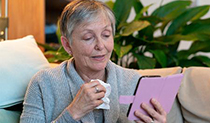
COVID-19 Vaccine Information
Skip
Q: Where will I be able to get COVID-19 vaccine?
A: The COVID-19 vaccine is widely available throughout the San Francisco Bay Area. It can be obtained at pharmacies, community clinics, and at healthcare providers including El Camino Health.
Q: Are you offering the vaccine to patients of all ages?
A:
- For anyone 12 and older, vaccines are available throughout the community and at El Camino Health's Outpatient Pharmacy and may be scheduled online. Pfizer-BioNTech and Moderna vaccines are available for this age group.
- For children 6 months to 11 years, please contact your pediatrician or visit the Santa Clara County vaccine website to make an appointment.
Q: What is the updated COVID-19 Vaccine and who can get it?
A: 2023-2024 formula: Pfizer-BioNTech or Moderna
- Per CDC guidelines; everyone 6 months and older should get one dose of the updated COVID-19 vaccine.
Q: Who qualifies for the bivalent mRNA COVID-19 booster shot?
A: You are eligible to receive one dose of updated COVID-19 vaccine if you are (per CDC guidelines):
- 5 years or older and it has been at least two months after getting the last dose of any COVID-19 vaccine.
- 6 months to 4 years old need multiple doses of COVID-19 to be up to date, including one dose of updated COVID-19 vaccine.
Q: How do I schedule a vaccine at El Camino Health?
A: Please use our online scheduler to make an appointment.
Q: How do I cancel my vaccination appointment?
A: Vaccine appointment thru the Outpatient Pharmacy can be cancelled via the link provided in your confirmation email or by calling the Outpatient Pharmacy at 650-988-8240.
Q: How do we know the COVID-19 vaccines are safe and effective?
A: Each vaccine has undergone a stringent review process by the U.S. Food and Drug Administration (FDA) — which is globally respected for its scientific standards of vaccine safety, effectiveness and quality — before it received the agency's Emergency Use Authorization. This means the FDA has determined there is substantial evidence that the vaccine is safe and effective in preventing a COVID-19 infection, particularly infection leading to hospitalization or death. In addition to clinical trials, we now have data gathered from the more than 610 million COVID-19 vaccine doses administered to date in the United States. Both the trials and the data from actual use clearly demonstrate that the vaccines are both safe and effective.
Q: I heard the COVID-19 vaccine won't prevent me from getting COVID-19. So why should I be vaccinated?
A: It is a common misconception that vaccines prevent individuals from contracting an illness. Vaccines train the body's immune system to recognize and effectively fight viruses and bacteria. When the body is exposed to a virus after being vaccinated against it, it is immediately ready to fight the illness. Because the body can respond more quickly, you are less likely to experience symptoms of the illness, especially severe and life-threatening ones.
Based on clinical trials and observations following the administration of more than 560 million doses, we know the COVID-19 vaccines are extremely effective in preventing severe illness, hospitalization and death from the virus. The populations who continue to face severe illness and death from COVID-19 are those that are unvaccinated.
Q: If I already had COVID-19, do I still need to get vaccinated?
A: Per CDC guidelines:
Yes. You still need to stay up to date with your vaccines, you may consider delaying your next vaccine dose by 3 months from when your symptoms started or if no symptoms, when you first received a positive test. Certain factors could be a reason to get a vaccine sooner rather than later.
Q: Can I get COVID-19 from the vaccine?
A:No. None of the vaccines currently available uses a live version of the virus, so a person who receives any of these vaccines cannot contract COVID-19 from the vaccination.
Q: If I receive the vaccine, what side effects can I expect?
A: Each COVID-19 vaccine has similar potential side effects, including fatigue, headache, muscle and joint pain, swollen lymph nodes and pain at the injection site. But none of the reported side effects are serious and long-lasting, and none are nearly as serious as the long list of potential complications of COVID-19, which include hospitalization and death.
Q: Will the vaccine affect my DNA?
A: No. The COVID-19 vaccines do not affect DNA. The vaccines train the body’s immune system to recognize and fight the virus.
Q: Can I get the vaccine if I am pregnant, want to get pregnant or am breastfeeding?
A: Yes. The Centers for Disease Control and Prevention (CDC) recommended that pregnant women get a COVID-19 vaccine after research showed that the vaccine does not pose additional risks for mothers or babies. In addition, the CDC has stated the vaccines pose no risk for breastfeeding women or their babies. In fact, studies have shown that the COVID-19 vaccine provides protection to infants through breast milk. There is also no evidence that any vaccines, including the COVID-19 vaccines, cause fertility issues.
If you are pregnant, please speak with your healthcare provider about whether the vaccine is recommended for you. If your doctor determines you should wait to receive a vaccine, you may defer your vaccination until you are no longer pregnant.
Q: Thousands of adverse events from the COVID-19 vaccines have been reported to VAERS. Why are we not concerned about these reports?
A: The function of the Vaccine Adverse Event Reporting System (VAERS), which is co-managed by the Centers for Disease Control and Prevention (CDC) and the U.S. Food and Drug Administration (FDA), is commonly misunderstood and is often the source of confusion. VAERS does not function as a reporting system for adverse events caused by vaccination. In fact, VAERS cannot and does not determine whether a vaccine caused a reaction or side effect at all.
A report to VAERS means only that an adverse event occurred sometime after vaccination. If a vaccinated individual develops a headache, for example, the headache may be reported to VAERS and recorded in the VAERS database. But VAERS does not determine whether the headache was caused by the vaccine or whether it developed coincidentally.
At this point, there is no information to suggest COVID-19 vaccines are unsafe. As of August 30, 2022, more than 224 million people in the U.S. have been fully vaccinated, and more than 108 million people received a booster dose. We have real-world evidence — in addition to clinical trial data — to indicate these vaccines are safe, and that adverse reactions to them are extremely rare.
Q: What serious adverse events have been reported after the COVID-19 vaccine and how often do these occur?
A: Hundreds of millions of people in the U.S. have received at least one dose of the COVID-19 vaccine and have demonstrated that the vaccines are safe and effective. Reports of adverse events following vaccination are rare and do not necessarily mean that the vaccine caused the medical issue. According to the CDC, the following are the rare adverse events that have been reported as of September 1, 2022:
- More than 608 million doses of the COVID-19 vaccine were administered from December 14, 2020 to August 24, 2022. Out of those cases, the mortality rate attributed to (not necessarily caused by) the vaccine is 0.0027%.
- Anaphylaxis is rare, but has occurred in five people per million vaccinated in the U.S.
- 671 cases of myocarditis and pericarditis have been reported in patients under 18 as on August 25, 2022.
- Guillain-Barre Syndrome in people who have received the Johnson & Johnson vaccine is rare.
- Thrombosis with thrombocytopenia syndrome developed four people per million who received the Johnson & Johnson vaccine.
Q: How can vaccines put an end to the pandemic?
A: The more people who are fully vaccinated, the harder it will be for the virus to spread from person to person and mutate into other, more infectious strains such as the delta variant. The COVID-19 vaccine has proven to be highly protective against all variants so far, and states with high vaccination rates have been able to dramatically reduce hospitalizations and deaths.
Today, data show that unvaccinated populations are causing the surging spread of the virus, and we are seeing that those who are not vaccinated are overwhelmingly the ones hospitalized or dying from COVID-19. A small number of breakthrough cases have resulted in fully vaccinated individuals getting sick with COVID-19, but these cases almost never lead to severe illness.
The bottom line is that getting vaccinated is the only way to end the pandemic. It is also the only way to protect yourself and others from getting severely ill from COVID-19. The sooner we all get vaccinated, the sooner the pandemic will be over.
You may also be interested in...
COVID-19 Information
Resource Center Home
COVID-19 FAQs
Schedule a Vaccine Appointment



